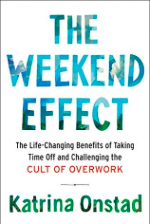 The weekends always seem to disappear in a blur. Hours pass running the kids to the pool, watching swim meets and getting organized for the busy week ahead. Saturday and Sunday are packed full of activities with little time to, as the kids say, “chill” and relax. How can we make the most of our weekends, reclaim some downtime and recharge for the busy week ahead?
The weekends always seem to disappear in a blur. Hours pass running the kids to the pool, watching swim meets and getting organized for the busy week ahead. Saturday and Sunday are packed full of activities with little time to, as the kids say, “chill” and relax. How can we make the most of our weekends, reclaim some downtime and recharge for the busy week ahead?
Katrina Onstad has researched the fleeting weekend in The Weekend Effect. The first two chapters focus on defining and describing the history of the weekend including the challenges our ancestors faced in their fight for 35-40 hour, five day weeks. It was interesting history to learn but I will be honest in that I was looking forward to the advice, tips and secrets to getting my weekend back.
Chapter 3 shared the importance of connecting with others and enjoying conversations (less texting and screens). As less families participate in spiritual gatherings on the weekends, there is less connection (the author even experimented by attending an ‘ecstatic dance party’, part of a weekly activity providing spiritual and social connection). There are conversation groups, weekend retreats for yoga or meditation and other community groups to bring people together. The author highlighted the importance of volunteering which not only helps others but can decrease the risk of depression and increase well-being. She also devoted a chapter to the togetherness of copies called ‘sexy time’ and again reiterated the importance of being screen free!
The fourth chapter, Binge, Buy, Brunch, Basketball: Better Recreation described the importance of hobbies and activities that help to inspire and recharge your batteries. Instead of experiencing “spectatoritis,” participate in that sport and get active! Beware of binge activities (put down that remote and turn off the netflix)! Stay away from the malls, avoiding buying more stuff that you don’t need for the sake of shopping to fill a void. She talks about a town that closes down on Sunday’s which leads to the question, do we really need to shop on Sundays? We do shop, because stores are open and it is convenient but can we commit to a day without shopping? The chapters on brunch were interesting, I supposed that I had never thought about brunch being the way for restaurants to get rid of the food from the rest of the week. She suggested coming together over food by taking a class, learning to cook and described “The League of Kitchens” where you can go and learn different styles of cooking from talented cooks that invite learners into their own kitchens. Finally, she talks about exercise (being something to get through) and the fun of sport (which as adults we often miss).
Do Less and Be More at Home was the topic of Chapter 5 which leads to conversation about minimalism and the chores that often must get done over the weekend. Suggestions to conquer the cleaning challenges are to attack one room each day and to enlist the kids to help. Many of us find it difficult to add entertaining to our already busy calendars and like the author, I find that spontaneous get togethers are the most enjoyable (I recall the day the power went out across Ontario in 2013 when we pulled together a great BBQ with our neighbours).
Overscheduled kids can be a challenge and the author handles this by having a one sport at a time rule. Her family tries to preserve their weekend time which may lead to tough choices yet gives free time for hikes and outdoor activities. As the parents of competitive swimmers, I can related to the busy weekends but have really appreciated the club’s approach to only one meet a month which gives everyone (parents included) more downtime.
Chapter 6 relates to the power of beauty, taking time to appreciate what is around you. Taking a simple walk in the bush can improve our outlooks. Walking through a museum or art gallery can help recharge our senses.
The final chapter is a manifesto of sorts and offers Onstad’s suggestions to a better weekend.
This book was thought-provoking but I think I was looking for some more concrete suggestions on not only how to enjoy my weekends but also to prepare for the weekend. How can we get all those chores done during the week so that we can relax on the weekend? How can we be more organized? More present? More engaged? I felt like this was a good start but it leaves me looking for more.
What will I do after reading this book?
- Be more mindful of the time spent (and example set) by setting limits on technology
- Get outside and enjoy nature – take a hike, camp this summer
- Connect with others – organize outings, participate in more random acts of kindness.






